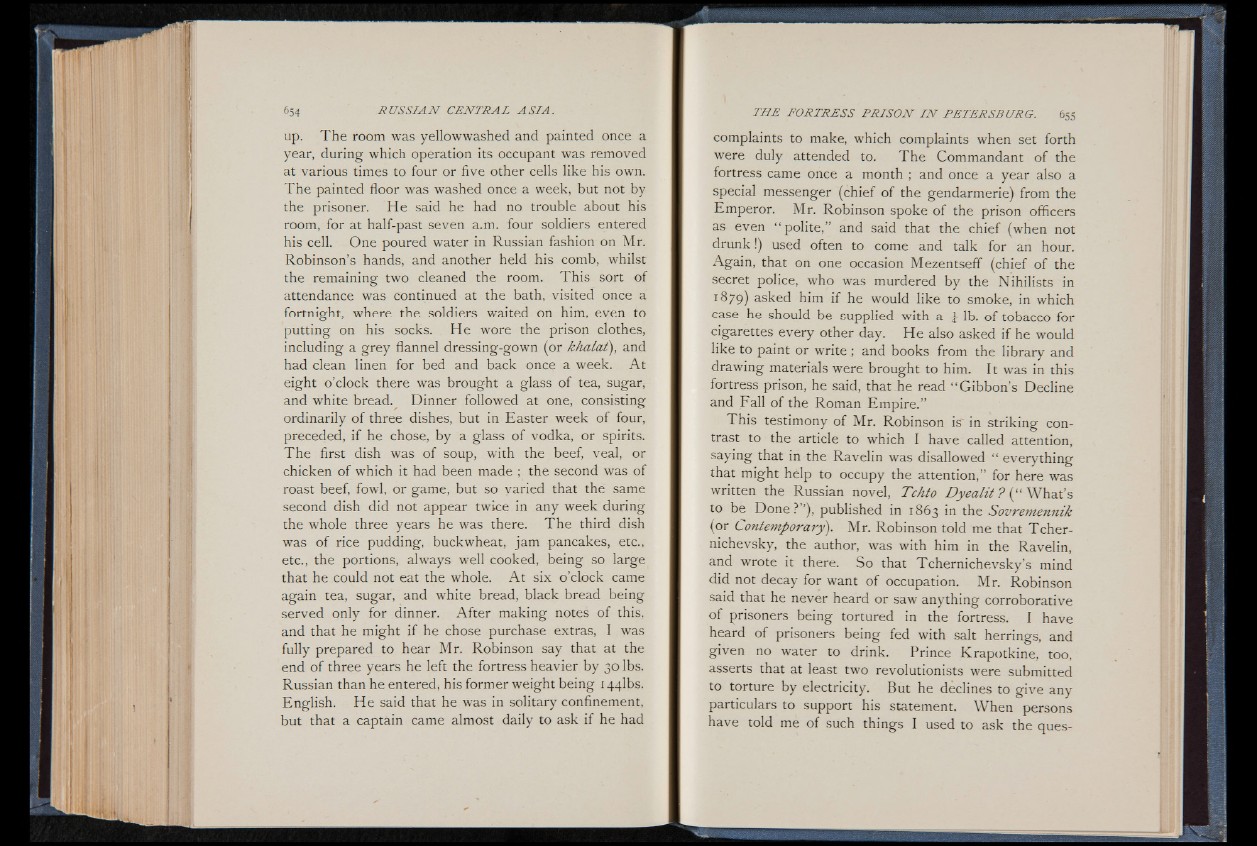
up. The room was yellow washed and painted once a
year, during which operation its occupant was removed
at various times to four or five other cells like his own.
The painted floor was washed once a week, but not by
the prisoner. He said he had no trouble about his
room, for at half-past seven a.m. four soldiers entered
his cell. One poured water in Russian fashion on Mr.
Robinson’s hands, and another held his comb, whilst
the remaining two cleaned the room. This sort of
attendance was continued at the bath, visited once a
fortnight, where the soldiers waited on him, even to
putting on his socks. He wore the prison clothes,
including a grey flannel dressing-gown (or khala£), and
had clean linen for bed and back once a week. A t
eight o’clock there was brought a glass of tea, sugar,
and white bread. Dinner followed at one, consisting
ordinarily of three dishes, but in Easter week of four,
preceded, if he chose, by a glass of vodka, or spirits.
The first dish was of soup, with the beef, veal, or
chicken of which it had been made ; the second was of
roast beef, fowl, or game, but so varied that the same
second dish did not appear twice in any week during
the whole three years he was there. The third dish
was of rice pudding, buckwheat, jam pancakes, etc.,
etc., the portions, always well cooked, being so large
that he could not eat the whole. A t six o’clock came
again tea, sugar, and white bread, black bread being
served only for dinner. After making notes of this,
and that he might if he chose purchase extras, I was
fully prepared to hear Mr. Robinson say that at the
end of three years he left the fortress heavier by 30 lbs.
Russian than he entered, his former weight being i44lbs.
English. He said that he was in solitary confinement,
but that a captain came almost daily to ask if he had
complaints to make, which complaints when set forth
were duly attended to. The Commandant of the
fortress came once a month ; and once a year also a
special messenger (chief of the gendarmerie) from the
Emperor. Mr. Robinson spoke of the prison officers
as even “ polite,” and said that the chief (when not
drunk!) used often to come and talk for an hour.
Again, that on one occasion Mezentseff (chief of the
secret police, who was murdered by the Nihilists in
1879) asked him if he would like to smoke, in which
case he should be supplied with a \ lb. of tobacco for
cigarettes every other day. He also asked if he would
like to paint or write ; and books from the library and
drawing materials were brought to him. It was in this
fortress prison, he said, that he read “ Gibbon’s Decline
and Fall of the Roman Empire.”
This testimony of Mr. Robinson is' in striking contrast
to the article to which I have called attention,
saying that in the Ravelin was disallowed “ everything
that might help to occupy the attention,” for here was
written the Russian novel, Tchto D y ea lit? ( “ What’s
to be Done?”), published in 1863 in the Sovremennik
(or Contemporary). Mr. Robinson told me that Tcher-
nichevsky, the author, was with him in the Ravelin,
and wrote it there. So that Tchernichevsky’s mind
did not decay for want of occupation. Mr. Robinson
said that he never heard or saw anything corroborative
of prisoners being tortured in the fortress. I have
heard of prisoners being fed with salt herrings, and
given no water to drink. Prince Krapotkine, too,
asserts that at least two revolutionists were submitted
to torture by electricity. But he declines to give any
particulars to support his statement. When persons
have told me of such things I used to ask the ques